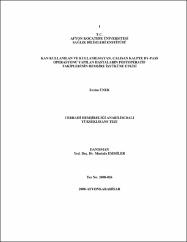Kan Kullanılan ve Kullanılmayan, Çalışan Kalpte By-Pass Operasyonu Yapılan Hastaların Postoperatif Takiplerinin Hemşire İsyüküne Etkisi
Abstract
Bu çalısma, kan ve kan ürünleri kullanımını azaltmak ve bu yolla
bulasabilecek hastalıkları önlemek, ayrıca kan transfüzyonunun postoperatif olumsuz
etkilerinden hastaları korumak ve hemsire is yüküne katkısını sorgulamak amacıyla
yapılmıstır.
Arastırmamız Kasım 2006 ve Haziran 2007 tarihleri arasında Afyon
Kocatepe Üniversitesi Arastırma ve Uygulama Hastanesi Kalp-Damar Cerrahisi
Kliniginde yatmakta olan ve arastırmamızı kabul eden 60 hasta üzerinde
uygulanmıstır.
Arastırmamıza; çalısan kalpte By-pass ameliyatı yapılan ve kan
transfüzyonu yapılmayan ve yine By-pass ameliyatı yapılan ve kan transfüzyonu
yapılan hastalar alınmıstır.
Kan transfüzyonu yapılan ve yapılmayan olmak üzere, iki grup alınmıs ve
degerlendirilmistir. Bu gruplarda hastalarda ameliyat öncesinde karaciger fonksiyon
testleri ve sedimantasyon degerleri alınmıstır.
Operasyon sonrasında ise, yine karaciger fonksiyon testleri, sedimantasyon
ve ek olarak beyaz küreleri ve çesitli günlerdeki; tansiyon arteriyel, nabız, subfebril
ve febril ates degerleri dikkate alınmıstır.
Ayrıca yine bu gruplardaki hastalardan; yas, kilo, boy degerleri alınmıs,
drenajları ameliyat öncesi ve sonrası degerleri, agrı sikayeti ile hemsire talepleri, agrı
ile verilen oral analjezikler ve postoperatif dönemde akciger sorunları nedeniyle
verilen tedaviler iki grupta karsılastırılmıstır.
Arastırmada anket sonuçlarına iliskin veriler, Student T testi ve Mann-
Whitney U testleri uygulanarak degerlendirilmistir.
Arastırma sonucunda; her iki grup arasında yas, cinsiyet, yandas hastalıklar
ve risk faktörlerinin benzer oldugu ayrıca kan kullanılmayan hastalarda sedimantasyon, febril ve subfebril ates sıklıgı, postoperatif dönemde ates ve agrı
sikayeti nedeniyle hemsire talebi anlamlı derecede daha düsük bulunmustur.
Sonuç olarak; kan kullanılmayan hastalar postoperatif dönemde hemsire is
yükünü azaltmakta ve daha az sorun bildirmektedirler. This study was performed to decrease the use of blood and blood products, to
prevent the diseases transmitted via blood transfusion, to prevent the postoperative
adverse effects of blood transfusion and to investigate the contribution of these
advers effects on the nursery work load.
The study was undertaken with 60 patients, whom admitted to participate in
the investigation, that were hospitalized in the Cardiovascular Surgery service of
Afyon Kocatepe University, School of Medicine between 2006 November and 2007
June. The patients who underwent by-pass operation in the beating heart without
blood transfusion and with blood transfusion were included into the study as two
groups. Erythrocyte sedimentation rate and liver function tests of all patients were
obtained preoperatively.
In the post-operative period, erythrocyte sedimentation rate, liver function
tests and additionally white blood cell counting, blood pressure, pulse and subfebrile
and febrile temperatures of the patients were obtained. Also; age, weight, height
values, the amount and dates of drainage, the complaint of pain to the nurses, the oral
analgesics taken due to the pain and treatments given secondary to the post-operative
pulmonary problems were recorded in both groups.
The results were analysed with Student T test and Mann-Whitney U test
statistically.
As a result, while age, gender, accompanying diseases and risk factors
were found similar in both groups; erythrocyte sedimentation rate, subfebrile and
febrile temperature frequency and nursing demand cause of fever and pain in the
post-operative period were found lower significantly in the group that were not
transfused.Consequently, the patients who were not transfused during by-pass
operation report fewer complaints and decrease the work load of the nurses
Collections
- Yüksek Lisans Tezleri [635]



















